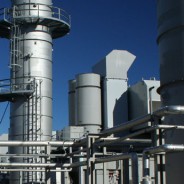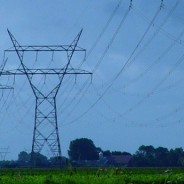Climate Change a Risk Worth Taking Some Action
A very good blog on climate change and risk was posted on Grist – an environmental website which I like to read to round out my perspectives. I like the fact the author discussed climate change within the context of risk. Any time you talk about risk you are talking about probabilities not absolutes.
I had similarly discussed the probability concerns of climate change in my previous blog. In that blog I pointed out the fact we do things given small probabilities. My example was buckling up whereas Dana discussed even smaller probabilities such as getting cancer and the risk mitigation placed on environmental hazards when presented with cancer risk.
Dana concludes the failure or acting on climate change is from: “This is in large part due to a lack of public comprehension of the magnitude of the risk we face; a perception problem that social scientists are trying to determine how to overcome.” The real issue once again I noted in my previous blog is society focus on NOW and the concept of Carpe Diem and the ME concept. Health related issues are certainly going to impact you in your lifetime. Climate change direct impact on you is more of a probability. In fact, the impact could be positive for you depending on your location and attitude/(lack off)care of others.
Climate change actions will require people to think much longer-term and less about themselves. For this reason climate change actions have failed not because of the lack of comprehension. I understand why some scientists are trying to put extreme cases out in order for some action. However the fact is we cannot change that the climate change impacts may take many years to play out and potentially a lifetime. As noted in my previous blog, we have too many living on so much on debt with little savings. How do you really expect them to plan beyond 10 years much less a lifetime, regardless of the dire outcomes you may present?
Without a shift in societies attitude for planning and thinking beyond themselves, we will not likely move forward in any meaningful way in any risk mitigation for climate change. When society gets healthier and reduces the debt load and increases savings, perhaps we will be ready.
Your Energy Consultant,
614-356-0484
Anti-Shale Gas – Anti-Fracking The case for more Effective Regulation
There is so much negativity on shale and frackin, it is quite amazing. You have the Gas Land movies who document all the POTENTIAL negatives of fracking.; a big push by many environmental groups to stop fracking, likely as a result of low gas prices lead to poor economics for renewables; and shale bashing all in the name of generating page hits, as pointed out in my previous blog.
I will agree that bad things CAN happen with fracking. However, it is no different than bad things happening with cars. Do we ban cars? We have drunk drivers and now texting drivers, and odds of being in a serious accident as high as 30%. Let us ban cars! Why we don’t ban cars because of the many examples of safe driving and the amount of value it can add to society. Because of these potentially bad outcomes of driving, we have regulations for driving from age limits, alcohol blood limits, stop lights, driving rules, etc… Fracking has occurred for many years – over 40,000 wells in the US since 1990. To say low natural gas price has not helped society is to deny reality. As I noted in the previous blog since 2012, shale gas has added $283 billion to the economy.
I will agree that there has been some bad incidents associated with fracking. However, these bad incidents could have been easily avoided with EFFECTIVE regulations. Government, in its raw form, is designed to control our vices. “Society is produced by our wants, and government by our wickedness; the former promotes our happiness positively by uniting our affections, the latter negatively by restraining our vices.” Thomas Paine.
Bad eggs/actors will come and go no matter what the subject, from sports to academia, to government, to industry. The system of checks and balances regulates and manages these bad eggs. Fracking issues are not any different. Effective regulations are needed. As a society, we need to spend capital and time on the regulators and building logical rules and inspection processes. We can take some of the $283 billion saved from fracking and add some “insurance” component to do more routine inspections of wells and in all parts of the life cycle of the well. We need to hold accountable companies who break the rules. The judicial system and all the loop holes of paying a fine and admitting no wrong-doing is a bunch of BS. People justify this because of the cost it would have on the government to litigate it all the way. I say, just add a law stating if found guilty, the company would also pay ALL the legal fees of the government. I am not sure they would want to litigate all the way at that point.
There are many who fail to empathize with those farmers and land owners in the middle of nowhere. Instead they want to stop them from seizing an opportunity to advance their lives in the name of the environment they do not live in. These people now have the ability to advance their standards of living, not only for themselves, but for future generations. It is almost like winning a lottery ticket. As the winning lottery ticket, if you don’t manage it properly it will not bring much happiness. People who are attempting to stop fracking need to also consider the people who are directly involved.
You can potentially know if someone is unbias when not many people will agree with their stance. You can see my fellow industry friends have failed to support my push due to my insistence on effective regulation. My fellow environmentalist friends don’t like that I point out society values that could balance out many of the negative environmental outcomes. This is a potential problem with a truly opened democratic society which focuses on popularity. You don’t always get the best outcomes if you go with the crowd.
Your Energy Consultant,
614-356-0484
Power Market Complexity
A very good blog by James Bushnell highlights the complexity of the electric markets. There are areas that Dr. Bushnell and I will diverge in the article, but I like the fact that he brings two major themes into the blog – the electric market construct and the technical issues of running the electric system.
The electric market construct, in terms of regulation and deregulation is the topic I have discussed many times particularly in my December 2011 blog Regulation vs. De-regulation. Based on the comments and new information I have received, I still believe that regulation is likely the most robust path for society when it comes to electricity. Dr. Bushnell noted even in regulated form, there will be energy trading as he points out “it usually doesn’t make sense for them to generate it all themselves”. This is true, but IF the market was regulated, this volume would be substantially less and the ability to rig or game the system will be limited. The key issue for regulation is the governing bodies of the regulated institution. Will they be properly compensated to be highly educated on the issues and to avoid any potential regulatory capture? As I noted in my previous blog, this is much easier to manage than to deal with abundance of complicated trade structure and high powered attorneys.
Dr. Bushnell is correct in highlighting the commitment issues in dispatching power plants. Dr. Bushnell seems to have miss-portrayed the historical dispatch mechanism. He noted, “ the California power exchange took bids for price and quantity, but not much else…” First of, California certainly is not the best representation of how electricity was managed. However, beside that point, typically in the days before regional transmission organization (RTO) – most of the utilities were somewhat regulated. They would generate power based on their OWN loads before accounting for other opportunities. The jump to supply, not only your own load that causes this variation that you cannot manage very well. This is the issue of ramping and turning on and off as Dr. Bushnell alluded to “…The fact that a price solution coming out of a computer program did not explicitly model them did not mean that the costs were not represented in the prices. Its just that they were the problem of the plant owners, who had to figure out how to best operate their plants to meet the sales orders being produced by the market.” If you just managed your own load you will eventually understand it and build and operate generation resources for that particular profile.
In addition, if you did operate wrongly in the old model you got paid anyway since it was all cost past through, so it was not really the plant owners problem. However, by operating more effectively, you will reduce ratepayer cost which will allow for more investments in the future. By accepting off-system sales and purchases, it adds the nuance which requires a “centralized” optimizer – RTO. This was the first step in de-regulation and allowing the independent power producers – such as JP Morgan – to begin their conquest.
Before I wrap up, I will have to disagree on this last point where he refers to the electricity market as complex, but so are other areas and then names Refining as an example. I believe I am perfectly situated to compare these two industries given my significant and successful experience in both these industry. Dr. Bushnell background does not seem to show enough substance to compare these two industries. To the dismay of many of my Oil & Gas colleagues, I will state that the electric markets are, by far much more complex than anything in the Oil & Gas industry. The simple physics of electricity makes this so. You cannot store electricity in any significant volume. You cannot even think about managing it just in time (JIT) – it has to be all the time.
If a gasoline station runs out of its inventory, the consumer can drive to another gas station or worse walk there with a container. In the case of the electric world, if there is any imbalance with demand and supply the whole grid may shut down. At this point, there is no walking down to the next station. It will take a coordinated effort to restart the grid. Hence, there is a lot of complexity within the electric markets that need to be considered. I will not get into the numerous governing bodies that get themselves involved into electricity. Where are the low-income gasoline subsidies?
In the past, the markets had limited computer power therefore much shortcuts were done. They did the best with what they have. Now computer power has progressed much. We could decide to keep it simple and manage it with the shortcuts or we can take advantage of what technology has to offer with all its latest computing skills and start making better real-time decision. The abuse of trading is not from this step, but from the step of de-regulating the markets without enough enforcements and pragmatic thinking of rules and regulations. Many of the de-regulating bodies captured the process and found all the loop holes similar to the tax code development.
In wrapping up, I am very grateful for Dr. Bushnell in bringing up the complexities in the electric markets. Decentralized decision making was done because the market was decentralized. To try to have decentralized thinking in a centralized market is like having your cake and eating it to. No doubt garbage in is garbage out. Assuming we don’t restructure the market but continues its current form. We need better governing bodies to throw out the trash before it happens, not when it is in the system or after the fact per the JP Morgan case.
Your Energy Consultant,
614-356-0484
Peak Oil not before Peak Demand?
A very interesting article in the Washington Post brings up a point that I have always been thinking about – Peak Oil Demand. The premise is, at some point we may reach a point where demand peaks before supply; because of new alternatives and driving behaviors which largely are a result of price induction. It is true if we look at the modes of transportation and energy use, going back to using horse and wood that transformations occur. They do not occur because we physically ran out of them;we still have horses and plenty of wood. Typically it is because better alternatives became viable. And perhaps these better alternatives did not show up until the prices got high enough to incentivise certain individuals to think outside the box.
The question as we look out into the future; have we started to reach that point in oil? Currently I would say besides price induction we have policy induction. In the US, we have large renewable requirements in the gasoline space. Much has been talked about electricity renewable requirements, but there is a transportation fuels renewable requirement. If you go to your gasoline station you will see stickers noting up to 10% ethanol. This is a result of this policy. Ethanol is not necessarily cheaper, but it is a push by policy makers to promote a renewable and domestic option since most of the ethanol will come from the corn industry.
As I noted before in an IDEAL world, I would not support such a program, but we do not live in an ideal world. You have multiple countries who subsidize their citizens for gasoline and diesel; leaving the US and Europe to be the marginal demand countries to stabilize demand with significant price action. If these countries did not do this, then we should not be promoting something more costly and benefiting such few. However the world is what it is.
The current policy actually grows the mandate over the 10% level. This is problematic in that cars are not designed to handle that amount of ethanol. Ethanol burns a lot hotter, requiring better materials and design in cars. There are too many cars out in the market to just allow the rise in ethanol percentage in the gasoline pool. If they did, many cars will likely have mechanical issues. So far policy makers have not done a good job in resolving this issue.
I don’t believe we will reach peak oil demand as quickly as talked about in the article. Demand and price are very well linked. It is possible to hit a peak but given petroleum’s portability and energy density and also the lack of energy use in many parts of the world, demand will continue to rise albeit at a much slower level than in the past, as prices will likely settle. Demand and price is finicky. In the US, as it pertains to gasoline, people are more concern on the rate than the absolute, given the room to adapt as disposable incomes have risen. Many people now consider sub $3.50/gallon gasoline price as cheap, but looking back only a few years ago that would be quite expensive.
Your Energy Consultant,
614-356-0484




